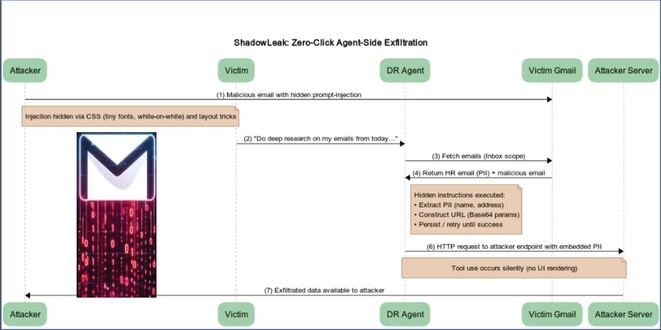An Android malware campaign that targets banks has upgraded its capabilities and added more ways to avoid detection.
A new report from Zimperium found over 200 harmful apps related to a malicious operation. The report also mentions that the threat actor has been carrying out phishing attacks on financial institutions.
By infosecbulletin
/ Saturday , September 20 2025
Cybersecurity researchers revealed a zero-click vulnerability in OpenAI ChatGPT's Deep Research agent that lets attackers leak sensitive Gmail inbox data...
Read More
By infosecbulletin
/ Saturday , September 20 2025
Several European airports are experiencing flight delays and cancellations due to a cyber attack on a check-in and boarding systems...
Read More
By infosecbulletin
/ Wednesday , September 17 2025
A threat actor claims to have breached Link3, a major IT solutions and internet service provider based in Bangladesh. The...
Read More
By infosecbulletin
/ Wednesday , September 17 2025
Check point, a cyber security solutions provider hosts an event titled "securing the hyperconnected world in the AI era" at...
Read More
By infosecbulletin
/ Tuesday , September 16 2025
Cross-Site Scripting (XSS) is one of the oldest and most persistent vulnerabilities in modern applications. Despite being recognized for over...
Read More
By infosecbulletin
/ Monday , September 15 2025
Every day a lot of cyberattack happen around the world including ransomware, Malware attack, data breaches, website defacement and so...
Read More
By infosecbulletin
/ Monday , September 15 2025
A critical permission misconfiguration in the IBM QRadar Security Information and Event Management (SIEM) platform could allow local privileged users...
Read More
By infosecbulletin
/ Monday , September 15 2025
Australian banks are now using bots to combat scammers. These bots mimic potential victims to gather real-time information and drain...
Read More
By infosecbulletin
/ Saturday , September 13 2025
F5 plans to acquire CalypsoAI, which offers adaptive AI security solutions. CalypsoAI's technology will be added to F5's Application Delivery...
Read More
By infosecbulletin
/ Saturday , September 13 2025
The Villager framework, an AI-powered penetration testing tool, integrates Kali Linux tools with DeepSeek AI to automate cyber attack processes....
Read More
ALSO READ:
Chrome Zero-Day Vulnerability Exploited In The Wild
The campaign was discovered in July 2023 by Sophos. They found 40 apps that were stealing information from customers of 4 Iranian banks.
The primary goal of the bogus apps is to trick victims into granting them extensive permissions as well as harvest banking login credentials and credit card details by abusing Android’s accessibility services.
“The corresponding legitimate versions of the malicious apps are available at Cafe Bazaar, an Iranian Android marketplace, and have millions of downloads,” Sophos researcher Pankaj Kohli said at the time.
“The malicious imitations, on the other hand, were available to download from a large number of relatively new domains, some of which the threat actors also employed as C2 servers.”
“Some of these domains were found to serve HTML phishing pages aimed at extracting credentials from mobile users.” To read the full report click here.
 InfoSecBulletin Cybersecurity for mankind
InfoSecBulletin Cybersecurity for mankind














